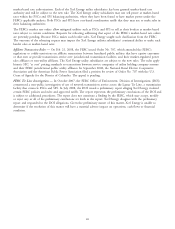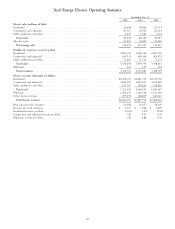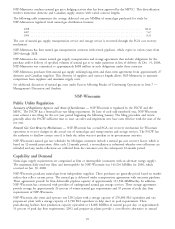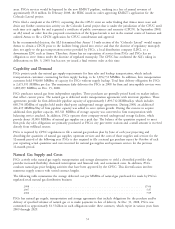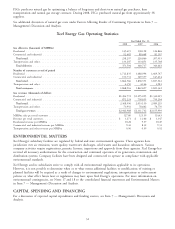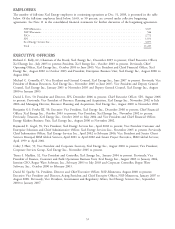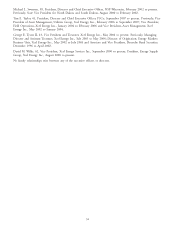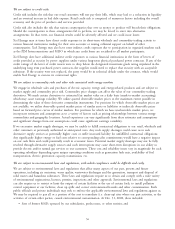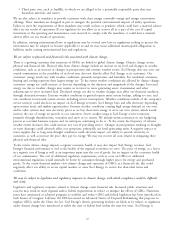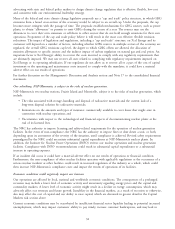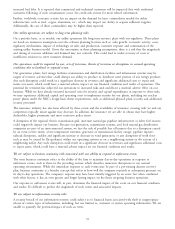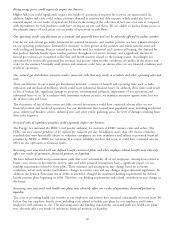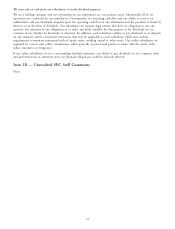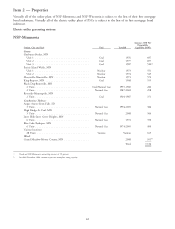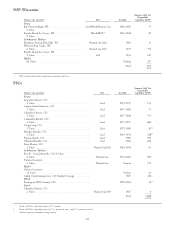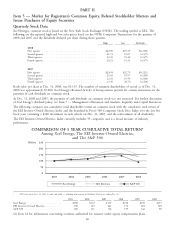Xcel Energy 2008 Annual Report Download - page 46
Download and view the complete annual report
Please find page 46 of the 2008 Xcel Energy annual report below. You can navigate through the pages in the report by either clicking on the pages listed below, or by using the keyword search tool below to find specific information within the annual report.We are subject to credit risks.
Credit risk includes the risk that our retail customers will not pay their bills, which may lead to a reduction in liquidity
and an eventual increase in bad debt expense. Retail credit risk is comprised of numerous factors including the overall
economy and the price of products and services provided.
Credit risk also includes the risk that various counterparties that owe us money or product will breach their obligations.
Should the counterparties to these arrangements fail to perform, we may be forced to enter into alternative
arrangements. In that event, our financial results could be adversely affected and we could incur losses.
Xcel Energy may at times have direct credit exposure in its short-term wholesale and commodity trading activity to
various financial institutions trading for their own accounts or issuing collateral support on behalf of other
counterparties. Xcel Energy may also have some indirect credit exposure due to participation in organized markets such
as the PJM Interconnections and MISO in which any credit losses are socialized to all market participants.
Xcel Energy does have additional indirect credit exposures to various financial institutions in the form of letters of
credit provided as security by power suppliers under various long-term physical purchased power contracts. If any of the
credit ratings of the letter of credit issuers were to drop below the designated investment grade rating stipulated in the
underlying long term purchased power contracts, the supplier would need to replace that security with an acceptable
substitute. If the security were not replaced, the party would be in technical default under the contract, which would
enable Xcel Energy to exercise its contractual rights.
We are subject to commodity risks and other risks associated with energy markets.
We engage in wholesale sales and purchases of electric capacity, energy and energy-related products and are subject to
market supply and commodity price risk. Commodity price changes can affect the value of our commodity trading
derivatives. We mark certain derivatives to estimated fair market value on a daily basis (mark-to-market accounting),
which may cause earnings volatility. We utilize quoted observable market prices to the maximum extent possible in
determining the value of these derivative commodity instruments. For positions for which observable market prices are
not available, we utilize observable quoted market prices of similar assets or liabilities or indirectly observable prices
based on forward price curves of similar markets. For positions for which we have unobservable market prices, we
incorporate estimates and assumptions as to a variety of factors such as pricing relationships between various energy
commodities and geographic locations. Actual experience can vary significantly from these estimates and assumptions
and significant changes from our assumptions could cause significant earnings variability.
If we encounter market supply shortages, we may be unable to fulfill contractual obligations to our retail, wholesale and
other customers at previously authorized or anticipated costs. Any such supply shortages could cause us to seek
alternative supply services at potentially higher costs or suffer increased liability for unfulfilled contractual obligations.
Any significantly higher energy or fuel costs relative to corresponding sales commitments would have a negative impact
on our cash flows and could potentially result in economic losses. Potential market supply shortages may not be fully
resolved through alternative supply sources and such interruptions may cause short-term disruptions in our ability to
provide electric and/or natural gas services to our customers. These cost and reliability issues vary in magnitude for each
operating subsidiary depending upon unique operating conditions such as generation fuels mix, availability of fuel
transportation, electric generation capacity, transmission, etc.
We are subject to environmental laws and regulations, with which compliance could be difficult and costly.
We are subject to environmental laws and regulations that affect many aspects of our past, present and future
operations, including air emissions, water quality, wastewater discharges and the generation, transport and disposal of
solid wastes and hazardous substances. These laws and regulations require us to obtain and comply with a wide variety
of environmental registrations, licenses, permits, inspections and other approvals. Environmental laws and regulations
can also require us to restrict or limit the output of certain facilities or the use of certain fuels, to install pollution
control equipment at our facilities, clean up spills and correct environmental hazards and other contamination. Both
public officials and private individuals may seek to enforce the applicable environmental laws and regulations against us.
We may be required to pay all or a portion of the cost to remediate (i.e. clean-up) sites where our past activities, or the
activities of certain other parties, caused environmental contamination. At Dec. 31, 2008, these included:
• Sites of former MGPs operated by our subsidiaries, predecessors, or other entities; and
36


